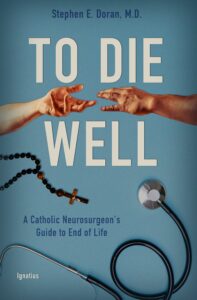Podcast: Play in new window | Download (Duration: 28:18 — 19.6MB) | Embed
Subscribe: Apple Podcasts | Spotify | Amazon Music | Android | Pandora | iHeartRadio | JioSaavn | Podchaser | Gaana | Podcast Index | Email | TuneIn | Deezer | Anghami | RSS | More

Episode 7 – The Complexity of Brain Death – The Final Journey with Dr. Stephen Doran, M.D.
In this episode, Dr. Stephen Doran and Kris McGregor explore brain death, its historical evolution, and challenges in determining death for organ transplantation. Highlighting the ontological nature of death, Dr. Doran cautions against dehumanizing language, and encourage trust in God for guidance in end-of-life decisions. He also mentions the significance of precise criteria and highlights the impact of a third party in organ donation decisions.
Dr. Doran advises against succumbing to perceived urgency, urging reflection and prayer. For those with regrets, he advocates assuming good intent, learning from the experience, and moving forward with newfound strength.
For more episodes in the series, visit The Final Journey: Insights from a Catholic Doctor and Neurosurgeon w/ Dr. Stephen Doran M.D. – Discerning Hearts Podcasts.
Stephen Doran, M.D., a board-certified neurosurgeon with over twenty-five years of experience, is an ordained permanent deacon and serves as the bioethicist for the Archdiocese of Omaha. His writings in bioethics, neurosurgery, and gene therapy for brain disorders have been widely published in national media outlets, academic journals, and neurosurgery textbooks. He is married with five sons. He co-founded Seeking Truth Catholic Bible Study with his wife, Sharon.
Discerning Hearts reflection questions for this episode:
- Ontological Reflection: How does Dr. Doran’s discussion deepen your understanding of death as an ontological event, separating the soul from the body?
- Evolution of Criteria: In what ways has the historical evolution of criteria for determining death influenced your perception of end-of-life decisions?
- Dehumanizing Language: Reflect on the caution against dehumanizing language, such as “harvest.” How can language impact attitudes towards organ donation and end-of-life decisions?
- Impact of External Interests: Consider the role of a third party in organ donation decisions. How does this introduction of external interests impact the decision-making process?
- Avoiding Perceived Urgency: Dr. Doran advises against succumbing to perceived urgency in end-of-life decisions. How can this perspective change your approach to such decisions?
- Prayerful Guidance: Reflect on the advice to trust in God for guidance in end-of-life decisions. How does prayer play a role in your decision-making process, especially in difficult situations?

You can find the book here
From the book description:
Dr. Stephen Doran draws from his vast experience as a neurosurgeon, a bioethicist, and a permanent deacon to present the Catholic perspective on the art of dying well. The spiritual and moral issues related to death and the process of dying can be challenging and complicated. To Die Well provides a detailed yet readily understandable guide to these topics.
Each chapter begins with a story from Dr. Doran’s personal or professional life that not only provides context for the topic at hand but also gently draws the reader toward the personal realities of dying. The first part focuses on the moral issues that surround death and dying, including end-of-life medical decisions. The second part is devoted to the Catholic spiritual understanding of dying and the rites that accompany the death of a Catholic.
To Die Well will help readers contemplate, pray about, and prepare for the end of their earthly lives.


